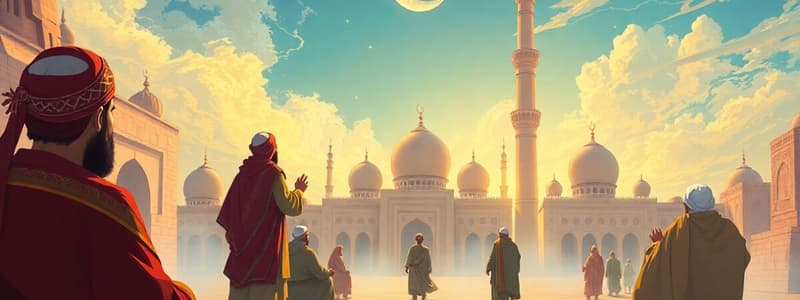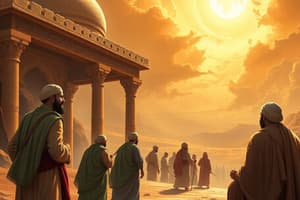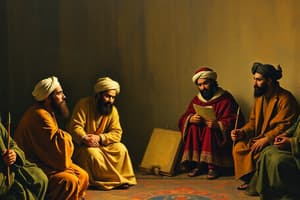Podcast
Questions and Answers
What does Adam's quick repentance signify in Islamic teaching?
What does Adam's quick repentance signify in Islamic teaching?
- It leaves a scar on the human condition.
- It emphasizes the need for punishment.
- It illustrates that the world is inherently good. (correct)
- It highlights human weakness.
What does the concept of predestination imply in Islam?
What does the concept of predestination imply in Islam?
- Life events are determined by fate without divine intervention.
- Only the good in life is predestined by God.
- All good and bad occurrences happen according to God's will. (correct)
- Individuals have complete control over their actions.
What does the term 'jihad' primarily refer to?
What does the term 'jihad' primarily refer to?
- An inner personal struggle for self-improvement. (correct)
- A governmental law imposed on all citizens.
- An economic strategy for resource allocation.
- A physical war against all non-believers.
How is Sharia law categorized in Islamic teachings?
How is Sharia law categorized in Islamic teachings?
According to Islamic belief, what happens after death?
According to Islamic belief, what happens after death?
What is one important feature of a hadith in Islamic context?
What is one important feature of a hadith in Islamic context?
Which of the following statements about the Quran is true?
Which of the following statements about the Quran is true?
What is meant by the term 'lesser jihad'?
What is meant by the term 'lesser jihad'?
Who looked after Muhammad after his mother died?
Who looked after Muhammad after his mother died?
What event marks the first year of the Islamic calendar?
What event marks the first year of the Islamic calendar?
What is the belief of the Shia regarding leadership in Islam?
What is the belief of the Shia regarding leadership in Islam?
Which group considers the Aga Khan as the 49th imam?
Which group considers the Aga Khan as the 49th imam?
What does the term tawhid refer to in Islam?
What does the term tawhid refer to in Islam?
Which of the following statements is true about the concept of God in Islam?
Which of the following statements is true about the concept of God in Islam?
What significant influence did Judaism and Christianity have on Islam?
What significant influence did Judaism and Christianity have on Islam?
What do Muslims believe about the creation of the world?
What do Muslims believe about the creation of the world?
Which group is known for opposing Sufism and Islamic rational theology?
Which group is known for opposing Sufism and Islamic rational theology?
What does Sufism primarily seek to achieve?
What does Sufism primarily seek to achieve?
Which holiday commemorates the sacrifice of Abraham's son?
Which holiday commemorates the sacrifice of Abraham's son?
What is the greeting exchanged during Eid celebrations?
What is the greeting exchanged during Eid celebrations?
What is the purpose of celebrating Mawlid?
What is the purpose of celebrating Mawlid?
What significant events occur during the Isra stage of the Night Journey?
What significant events occur during the Isra stage of the Night Journey?
How long does the Eid al Fitr celebration typically last?
How long does the Eid al Fitr celebration typically last?
What is debated among scholars regarding Mawlid?
What is debated among scholars regarding Mawlid?
What significant instruction did Allah give during the Mi'raj?
What significant instruction did Allah give during the Mi'raj?
What is the required action to become a Muslim?
What is the required action to become a Muslim?
How many times a day are Muslims required to pray?
How many times a day are Muslims required to pray?
What is the purpose of Zakat?
What is the purpose of Zakat?
During which month do Muslims fast from dusk until dawn?
During which month do Muslims fast from dusk until dawn?
What is the maximum number of wives a Muslim man can have?
What is the maximum number of wives a Muslim man can have?
What is one of the practices regarding burial in Islam?
What is one of the practices regarding burial in Islam?
What must Muslims abstain from during the month of Ramadan?
What must Muslims abstain from during the month of Ramadan?
What title is given to a Muslim after completing the Hajj pilgrimage?
What title is given to a Muslim after completing the Hajj pilgrimage?
What is the significance of the 27th day of Ramadan?
What is the significance of the 27th day of Ramadan?
Which of the following statements about sacraments in Islam is correct?
Which of the following statements about sacraments in Islam is correct?
What role do angels play in Islamic belief?
What role do angels play in Islamic belief?
How do Jinn differ from angels in Islamic tradition?
How do Jinn differ from angels in Islamic tradition?
Which of the following is NOT one of the Five Pillars of Islam?
Which of the following is NOT one of the Five Pillars of Islam?
What does the Shahadah represent in Islam?
What does the Shahadah represent in Islam?
How is the concept of sin viewed in Islam compared to Christianity?
How is the concept of sin viewed in Islam compared to Christianity?
Why are Muslims required to fast during Ramadan?
Why are Muslims required to fast during Ramadan?
Flashcards are hidden until you start studying
Study Notes
Islam
- Muhammad
- Orphaned at a young age, raised by his grandfather and uncle.
- Worked in the caravan trade as a young man.
- Married Khadija, a wealthy widow, at age 25.
- His religious experiences formed the foundation of the Quran.
- His message emphasized the one true God and condemned idolatry, advocating for justice for the oppressed.
- Faced persecution in Mecca and fled to Medina with his followers in 622 CE, marking the start of the Islamic calendar (Hijra).
Divisions of Islam
- Sunni
- Traditional form of Islam, representing 85% of Muslims.
- Believe political leadership should belong to loyal companions of Muhammad and their successors.
- Shia
- The largest Muslim minority.
- Believe in the leadership of the Imam, a descendant of Muhammad through his daughter Fatima and husband Ali.
- Recognize 12 Imams as divinely appointed leaders.
- Ismaili
- Shia group that differs with other Shia about the 7th Imam.
- Regard the Aga Khan as the 49th Imam.
- Kharijite
- Early group that withdrew support for Ali.
- Argued that any pious Muslim could lead, not just those from Muhammad's family or tribe.
- Wahhabi
- A puritanical Sunni reform movement founded in 1746.
- Opposed Sufism and Islamic rational theology, rejecting interpretations of Islam deemed heretical.
Beliefs
- God (Allah)
- One, all-powerful, and creator of the universe.
- Concept of "tawhid" emphasizes the unity of God.
- "Allah" is the Arabic word for "God", not a personal name.
- Muslims believe in 99 epithets (Excellent Names) describing God's attributes.
- "Allahu Akbar" (God is great) expresses the supremacy of God.
Visible and Invisible World
- Visible World
- God created the universe, including Adam and Eve, who introduced chaos through disobedience.
- God forgave Adam's sin quickly, leaving no lasting negative impact on humanity or creation.
- The world is a divine gift and a blessing for believers.
- Invisible World
- Belief in unseen beings like angels and jinn.
Predestination, Death, and Afterlife
- Predestination
- Belief that all events, both good and bad, occur according to God's will.
- Reflected in the common saying "Insha'Allah" (if God wills).
- Death and the Afterlife
- Death is not the end, but a transition.
- Judgment day determines eternal destiny in either paradise (heaven) or hell.
Jihad and Law
- Jihad (struggle)
- The "Great Jihad" is the internal struggle against personal temptations.
- The "Lesser Jihad" is the external struggle, often referred to as "holy war", against those who oppose Islam.
- Shariah
- Islamic law, derived from the Quran and Sunna (Muhammad’s teachings).
- Defines acceptable behavior based on God's commands.
- Includes categories for discouraged, recommended, permitted, and neutral actions.
Leadership
- Prophets
- Islam recognizes 124,000 prophets from Adam to Muhammad.
- 25 are named in the Quran, while others are mentioned indirectly.
- Muhammad is considered the final prophet.
- Muhammad's Leadership
- First leader of the Muslim community, continued influence through generations.
Revelation
- Quran
- Most recent revelation from God to humanity, considered God's literal word.
- 90 chapters (surahs) were revealed in Mecca (604-622 CE), and 24 in Medina (622-632 CE).
Sufism
- Mystical Tradition
- Focuses on achieving divine love and knowledge through personal experience of God.
Practices
Holidays
- Eid al-Adha (Feast of the Sacrifice)
- Commemorates Abraham's willingness to sacrifice his son (Ishmael/Isaac).
- Celebrated with communal prayer, animal sacrifice (in some regions), and feasts.
- Eid al-Fitr (Feast of the Breaking of the Fast)
- Marks the end of Ramadan, the month of fasting.
- Celebrated with feasting, prayers, and family gatherings.
- Mawlid (Muhammad's Birthday)
- Celebrated on the 12th day of the 3rd month of the Islamic calendar.
- Includes mosque visits, recitations of religious poetry, and public celebrations in some communities.
- Isra Mi'raj (Night Journey)
- Narrates Muhammad's miraculous journey to Jerusalem and ascension to heaven.
- Commemorates the establishment of the five daily prayers.
- The Night of Power (Laylat al-Qadr)
- Celebrated on the 27th night of Ramadan.
- Believed to be the night when the Quran's revelation began.
Sacraments
- No equivalent of sacraments in Islam.
- Sin and Forgiveness
- Muslims believe in repentance and forgiveness from God.
- Sin does not create a universal state of fallenness as in Christianity.
- God's creation, including challenges, are seen as a divine test to encourage spiritual growth.
Jinn and Angels
- Angles
- Every person has two guardian angels, one recording good deeds and one bad deeds.
- Jinn
- Supernatural beings with free will.
- Can choose to submit to God or reject His guidance.
- Iblis (Satan) is the chief tempter, cast out for refusing to bow to Adam.
The Five Pillars
- Confession of Faith (Shahadah)
- Declaring belief in one God and Muhammad as His messenger.
- Formalizes one's acceptance of Islam.
- Prayer (Salat)
- Five daily prayers at prescribed times.
- Muslims pray facing Mecca, preceded by ritual washing and a call to prayer.
- Alms (Zakat)
- A tax on possessions and agricultural produce.
- Used for the poor, education, and mosque construction.
- Fasting (Sawm)
- Abstinence from food, drink, and sexual relations during Ramadan.
- Exceptions are made for the sick, elderly, pregnant women, and travelers.
- Pilgrimage (Hajj)
- Journey to Mecca, expected once in a lifetime for those physically and financially able.
- Involves rituals around Mecca, symbolizing Abraham's story.
The Rites of Passage
- Circumcision
- Recommended but not universally mandatory.
- Marriage
- Men can marry up to four wives with financial and emotional ability to support them.
- Muslim men can marry Christian or Jewish women, while Muslim women can only marry Muslim men.
- Sex before marriage is forbidden.
- Homosexuality is not permitted.
- Death
- Tradition to bury the deceased the same day.
- Buried on the right side facing Mecca.
- Three days of mourning are observed.
- The deceased enters a state called Barzakh, awaiting judgment.
Studying That Suits You
Use AI to generate personalized quizzes and flashcards to suit your learning preferences.




